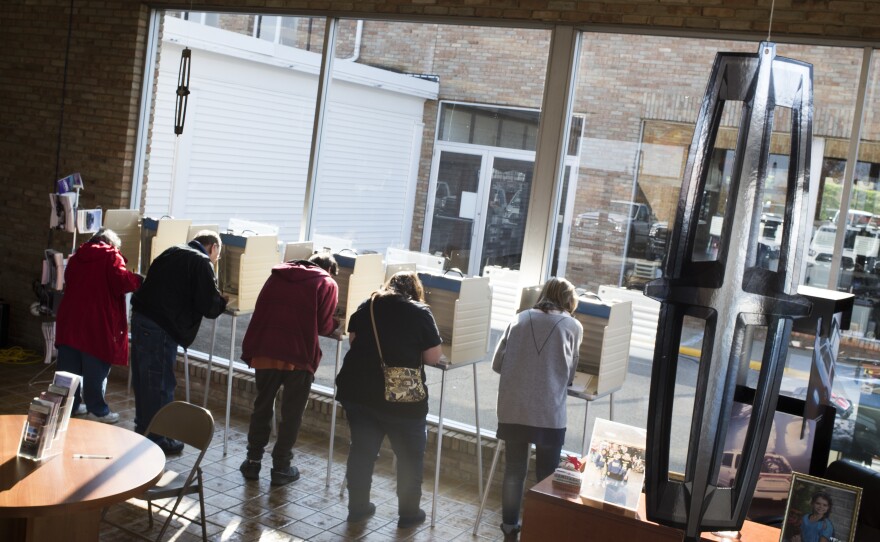The U.S. Supreme Court hears arguments Wednesday in an important voting-rights case testing whether Ohio's so-called "use-it or lose-it" voter-registration rule violates federal law.
The state statute, which is the most aggressive voter-purge law in the country, strikes voters from the registration rolls if they fail to vote in two consecutive elections, and if they fail to return a mailed address confirmation form.
A voter feels stiffed on Election Day
The lead plaintiff in the case is Larry Harmon, a software engineer from the Akron area, who normally votes in presidential election years, but not the midterms. In 2012, neither Barack Obama nor Mitt Romney excited him, so he decided not to vote.
When he did decide to vote a couple of years later, he found he was no longer registered. He had been purged from the voter rolls because he hadn't voted in the previous two elections.
"I kind of got angry," Harmon said. "I've been paying taxes and doing all the things required of me to be a good citizen, but they had turned me away and taken away my right to vote."
He said he doesn't remember getting any sort of mailed request from the state to confirm his voting address. After all, he said, he's lived at the same address for more than 16 years, and he and his neighbors often get each other's mail.
"I don't know why they trusted the U.S. mail, unless they were going to send me a registered letter," he said.
He noted there are many other ways to check addresses — tax forms, property-tax listings and driver's licenses, to name just a few.
Is the right to vote like the right to buy a gun?
"I've earned the right to vote," the navy veteran said. "Whether I use it or not is up to my personal discretion. They don't take away my right to buy a gun if I don't buy a gun."
So he sued the state, represented by Demos, a liberal public policy organization, and he won. The lower courts said that Ohio's voter purge law violates the National Voter Registration Act, better known as the "Motor Voter law."
The law is aimed at making voter registration easier. It says that while states should take steps to keep their voting rolls up to date and accurate, they may not remove people from the rolls "by reason of a person's failure to vote."
Ohio Attorney General Mike DeWine declined to be interviewed for this article. But in its briefs, Ohio claims it is not using failure to vote as the reason for striking Larry Harmon and thousands of other voters from the rolls.
Rather, the state argues, it is striking from the rolls those who do not vote for two years, and who fail to confirm their registration at the same address over the next two years.
Harmon and his lawyers contend that the trigger for removal is in fact the failure to vote in two consecutive elections.
Is the issue partisan?
Twelve states, largely controlled by Democratic officeholders, have filed briefs supporting Harmon. They all point to methods they say are far more effective than unregistered mail for ascertaining whether someone has changed his or her legal voting address.
They also point to other reasons people may have temporarily moved, but not changed their voting address, including military service.
Nineteen states, largely controlled by Republican officeholders, on the other hand, are supporting Ohio's position, though none has a law as aggressive as Ohio's in seeking to verify the voter registry.
Stuart Naifeh, who will argue the case for Harmon, notes that both Democratic and Republican secretaries of state have used this system in Ohio for decades.
"We don't believe it's a partisan case," he says. "We believe that what Ohio is doing is unlawful under the National Voter Registration Act regardless of the party of secretary of state."
Failure to vote is not unusual in this country. In 2016, 29 percent of the registered voters in Ohio failed to vote. Nationwide, the number was even higher, more than a third, according to the U.S. Election Assistance Commission.
Lawyers arguing against the Ohio voter purge system note that once you miss two federal elections in that state and fail to reaffirm your registration, if you go to vote, and cast a provisional ballot, that ballot will not be counted because you are no longer registered.
The irony is that, by casting a provisional ballot and swearing to your address you will be able to vote in the next election.
Copyright 2018 NPR. To see more, visit http://www.npr.org/.






